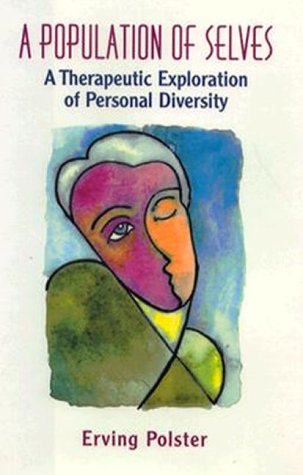Verwandte Artikel zu A Population of Selves: Therapeutic Exploration of...
A Population of Selves: Therapeutic Exploration of Personal Diversity (JOSSEY BASS SOCIAL AND BEHAVIORAL SCIENCE SERIES) - Hardcover

Inhaltsangabe
In this book, Erving Polster - co-author of "Gestalt Therapy Integrated" - expands the knowledge and thinking on the development of self. This text offers health professionals varying ways to think about and work with clients to help them realize a powerful and healthy sense of Self. This text should be useful for therapists, psychologists, social workers and consellors.
Die Inhaltsangabe kann sich auf eine andere Ausgabe dieses Titels beziehen.
Über die Autorin bzw. den Autor
ERVING POLSTER is co-director of the Gestalt Training Center in San Diego, California, and clinical professor in the department of psychiatry at the School of Medicine, University of California, San Diego. He was a founder of the Gestalt Institute in Cleveland.
Von der hinteren Coverseite
Erving Polster, coauthor of the landmark work Gestalt Therapy Integrated, greatly expands the knowledge and thinking on the development of the self. This important book offers therapists new ways of thinking, as well as specific procedures to help patients realize a powerful and healthy sense of self.
Aus dem Klappentext
Erving Polster--coauthor of the landmark work Gestalt Therapy Integrated--greatly expands the knowledge and thinking on the development of self. A Population of Selves offers therapists new ways of thinking about the self as well as specific procedures to help patients realize a powerful and healthy sense of self: a goal at the very heart of the therapeutic process.In an innovative expansion of therapeutic theory, Polster shows how the human reflex to summarize and animate experiences serves as a natural springboard for the formation of selves. He enlarges the therapeutic aim of synthesizing alienated aspects of a person by offering a construct of heterogeneous characters within, each with its own place and voice. Every person is host to a population of selves: the infantile, the cunning, the rebellious, the tAnder.Using case examples from his own therapeutic practice, Polster illustrates eight major pathways for therapists to elicit new selves and to help their patients renew neglected or misunderstood selves. His approach ties self theory more closely than ever to actual therapeutic practice. He shows how to evoke selves through the use of stofy, and he explains how to tighten up therapy sessions to encourage the emergence of selves. Polster also suggests techniques aimed at improving contact among various selves, as well as between therapist and patient, and then augmenting strong contact with the powerful complementary use of empathy. Finally, he demonstrates how to guide patients through their alienated selves and, without robbing each of its identity, link these selves to create a greater sense of personal identity.
„Über diesen Titel“ kann sich auf eine andere Ausgabe dieses Titels beziehen.
EUR 7,68 für den Versand von USA nach Deutschland
Versandziele, Kosten & DauerSuchergebnisse für A Population of Selves: Therapeutic Exploration of...
A Population of Selves : A Therapeutic Exploration of Personal Diversity
Anbieter: Better World Books, Mishawaka, IN, USA
Zustand: Good. 1st Edition. Former library book; may include library markings. Used book that is in clean, average condition without any missing pages. Artikel-Nr. GRP62612060
Anzahl: 1 verfügbar

